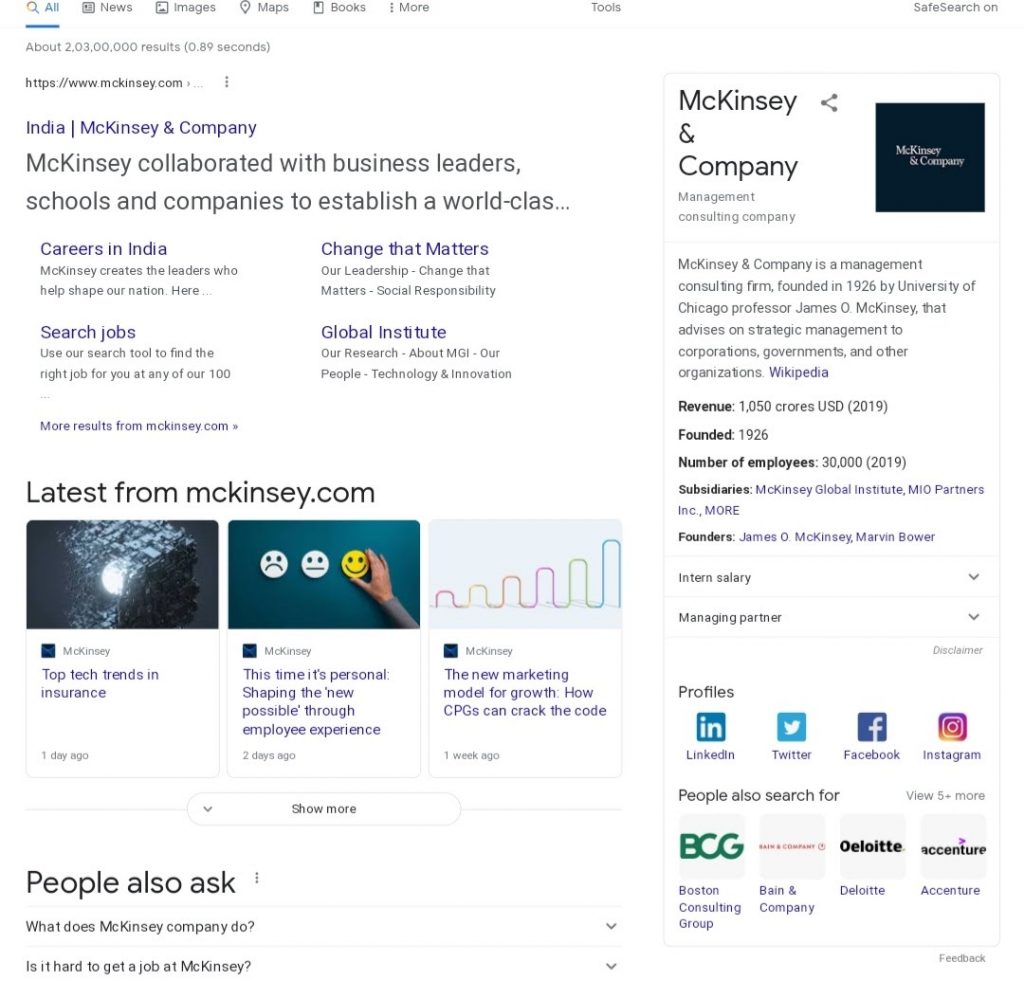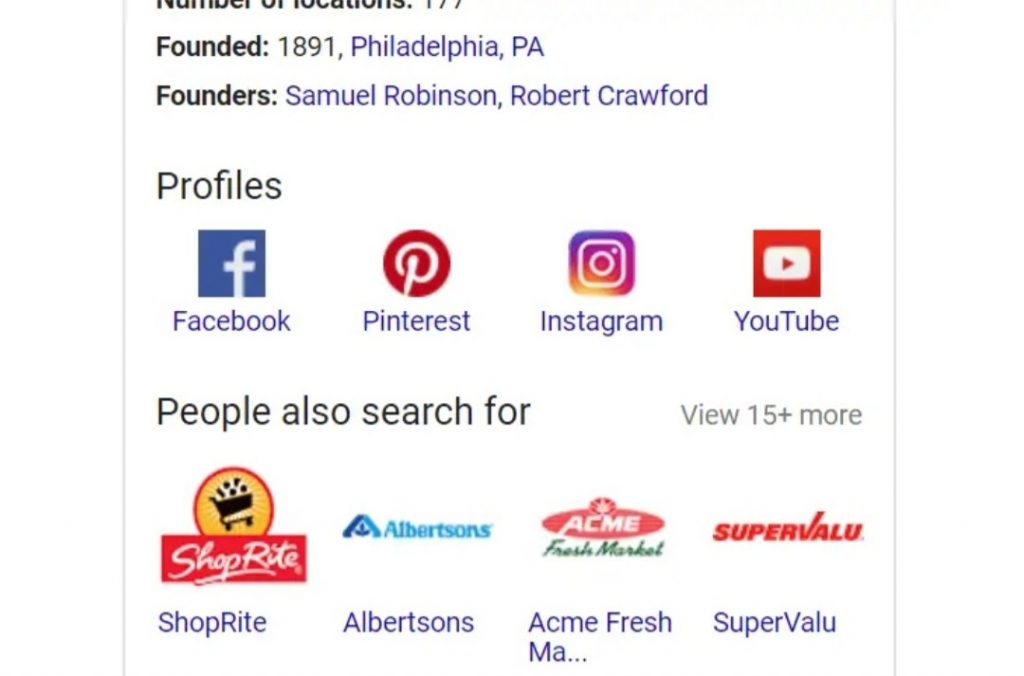What is Schema MarkUp? How it will be Helpful to your Business
When there is cut-throat competition in the digital space to showcase one’s business with the overly saturated market — businesses and digital marketers need to go above and beyond to stay ahead of the curve.
Quick Links
Before we discuss how schema markup helps your business, I want you to understand what schema markup is. You are in luck! In this article, I’m going to explain all in detail.
What is a Schema Markup?
Schema Markup is sometimes called Schema.org.
It is a semantic vocabulary of microdata or tags that one can add to your HTML to improve the way search engines read and represent your page in SERPs.
If you’ve ever used rich snippets, you will understand exactly what schema markup is all about.
Basically, you’re making it easier for Google to understand your website and services. And that’s the exact need of Google.
Here’s an example of the Boston Theatre that has markup on its upcoming Broadway show’s page. The SERP entry looks like this:

Here, if somebody searches for the best Broadway show in Boston in the SERP itself, the Boston Theatre will display the particular upcoming shows and their dates. Quite convenient for the people, and a lot of footfall for the theatre, isn’t it?
Here’s another example:
The first search result has both a star rating and a publication date. Both of which have been added using Schema. In the second example, due to the lack of rich snippets, the search result will instead display either the meta description or any other information chosen by Google.
What data can be displayed in the Schema?
Schema markup can help your website rank better for all kinds of content types. There is data markup for a ton of different types of data, including:
- Articles
- Local businesses
- Restaurants
- TV episodes
- Ratings
- Book reviews
- Movies
- Software applications
- Events
- Products
- Frequently asked questions (FAQ)
Benefits of Using Schema Markup For Your Business
Schema Markup is not only useful for optimizing your website, but it can help your business to reach the targeted audience. Schema acts as a mediator between businesses and search engines, as both are concerned about the user experience.
As search engines want to display accurate data and businesses need to spread awareness and brand visibility, a schema is beneficial for both.
Here’s how your business can benefit from schema markup:
Enhance brand visibility through a knowledge graph
Schema helps you provide a strong boost to your brand presence online, especially through a knowledge graph. It is a big box on the right-hand side of Google desktop searches, as you can see in the image below. It is in front and centre in mobile searches.

It has the important pertinent business information that customers need to know, like phone numbers, social accounts, customer reviews, etc. However, many businesses don’t have a complete knowledge graph, if they have one at all in the first place.
Google will display knowledge graphs only if they are highly confident the information contained within is accurate and useful. Make it easier for search engines to trust your company’s information (and thus show a knowledge graph) by marking particular info up as structured data on your site. In this way, you can explicitly provide Google with your preferred logo, hours of operation, website link, phone number, and more.
Improve Localization
While listing your local businesses schema can be a great help. When an organization has numerous branches, franchisees, dealers, or distribution centres, all can benefit from applying schema markup.
Your business will get better exposure for local search queries. Schema can help you target location-based customers when your business is spread across different regions.
For multilingual helps to improve your website localization also.
Help Search Engines understand your content properly.
Schema markup is created to make search engines understand your site’s content better.
So, the number one benefit of using Schema is to help your content be found to relevant searchers first.
Even though search engines like Google know enough, they must know what your site is about exactly. Sure, with machine learning and the other data Google has, it probably has a good idea of what your site is about, whether it covers news, sells homemade e-commerce products, or is an anime fan fiction blog. But it isn’t 100% sure of every point.
Schema is your chance to precisely tell search engines exactly what your video, blog, website, image, the salary bracket of the job you just posted, what your customer service number is, and more.
The more you make things easier for Google to understand what you’re selling, the easier for you to secure a good position in SERP, hence a relatively positive impact on your lead generation.
Make a great first impression in SERPs.
Your chance to make a good first impression with a prospect starts in the SERPs. It would be great to own that customer experience right from the beginning, wouldn’t it? Schema markup allows you more control over the way your business is represented. It can help you define exactly how you want your brand’s content to be understood. You can easily test different strategies and see which drives the most traffic to your websites.
A standard search delivers three pieces of information: a title, a URL, and a meta description. Rich results are additional information coupled with eye-catching visuals that attract your attention in search. They bring your content alive, plus they take up more real estate in the search results pages, helping you outshine your competition.
For instance, you can show these things first with Schema — client testimonials, customer reviews and ratings, products, prices, and whatever else from your website you want to choose.
Become eligible for more space on Google!
It is not an organic listing that we are talking about now but rather a separate information box other than your organic listing. This could be a video carousel, a top stories carousel, or an information table at the top of the search, to name a few.
Marketers often refer to SERP features as Position 0 since they are often on top of even the first organically ranked result. Some even don’t like that these “answer boxes” offer an immediate answer right in the SERP list that may eliminate a visit to your website. They are also most likely to click on the article that gave them the answer to read more.
Get picked up as answers for voice search by Alexa and Google Assistant.
Voice search is on the rise, and more and more customers are using it to access the internet and get things done — making it a potent space for SEO.
With voice search results, there is only one result provided. So being in that top position on voice search is more important than regular search. Fortunately, a lot of practices that lead to featured snippets in regular searches are the same for voice SEO. Structured data is one of them.
So, Schema Markup helps you increase your odds of becoming the #1 voice search. Also, there is a new speakable schema that is particularly used for marking up parts of your website which are meant to be spoken and are thus relevant for voice search results.
Shoot up your social media following
Who doesn’t want to increase that social media following these days, especially if you are a businessperson? Schema markup can help you achieve this quite effectively.
You can mark up your social accounts using the SameAs Schema to get the social icons of social media platforms in your Google results. Here is an example of how it will look:

In conclusion, schema markup is a potent SEO tool that can help you not only boost conversion rates but also help you create the desired image in the eyes of your customers and prospects.
Author Bio

Narayani Pandya
Narayani is an enthusiastic digital marketing professional, having work experience in sales and customer experience in the past. She enjoys having a cup of tea and walking on the grass when not working.
What Is WooCommerce Product Slider and Why Your Store Needs It
Why Do Product Images Matter So Much in Online Stores? When someone visits an online store the…
0 Comments9 Minutes
How to Streamline Your Customers’ Shopping Experience?
The goal for any online store is to make shopping as smooth as possible. When visitors move…
0 Comments8 Minutes
Strengthening Brand-Customer Relationships Through Gamified Loyalty Programs
Creating lasting connections with customers has become increasingly vital as the marketplace grows…
0 Comments6 Minutes
How to Use SEO and SEA Together in Search Engine Marketing
In digital marketing, search engine marketing (SEM) plays a critical role in improving online…
0 Comments10 Minutes
Content Marketing Growth Hacks: Real Shortcuts to Drive Traffic
Are you still lagging in content marketing? Sticking to these old strategies seems…
0 Comments10 Minutes
How to Build a Strong Local Following Using Social Media Marketing
In the days of likes, shares, and stories, local businesses have a golden opportunity to create…
0 Comments9 Minutes
Why WooCommerce is the Best Choice for Your Online Store?
WooCommerce stands out as a top option for anyone looking to build an online store. This platform…
0 Comments8 Minutes
How to Use AI-Powered SEO Tools for WordPress eCommerce
SEO is a critical factor in the success of any e-commerce WordPress store. As competition…
0 Comments11 Minutes








